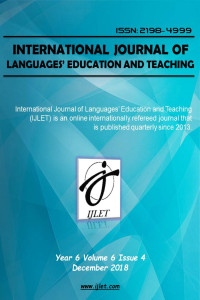Examining the Relationship between Early Literacy Skills, Parents’ Reading Beliefs and Home Literacy Environment
Abstract
This research aimed to reveal the relationship between early literacy skills (phonological awareness, receptive language skill, writing awareness, writing preparation, name writing), home literacy environment and parent reading beliefs. Relational survey model was employed and random sampling was used to recruit participants. The participants of the research were 71 pre-school children and 107 children attending the nursery school, and the parents of these children. Seven different data collection tools were used in the study. Computer assisted statistical program was utilised for data analysis. Findings show that parent reading beliefs are high; the parent reading belief increases as the level of education increases; and monthly income affects parents’ reading beliefs. It has been determined that the home early literacy environment is moderate, the monthly income and the education level have no effect on the home early literacy environment. It is also clear that there is a meaningful and very weak relationship between parental reading beliefs and home early literacy environment. Similarly, there is a meaningful and very weak relationship between parental literacy skills and children's literacy skill of writing awareness and receptive language skills. On the other hand, findings demonstrate no relationship between home early literacy environment and children's literacy skills.
Keywords
Early literacy skills parents’ reading beliefs home literacy environment early childhood education literacy development
References
- Anderson, J. (1995). How parent’s perceptions of literacy acquisition relate to their children's emerging literacy knowledge. Reading Horizons, 35(3), 209-228.
- Audet, D. R. (2013). Parent goals and beliefs and their prediction of behaviour during shared book reading. Unpublished doctoral thesis. University of Guelph, Canada.
- Baker, L., & Scher, D. (2002). Beginning readers’ motivation for reading in relation to parental beliefs and home reading experiences. Reading Psychology, 23(4), 239-269. doi:10.1080/713775283.
- Bayraktar, V., & Temel, F. (2014). The effect of the program of readiness education on the skills on reading-writing skills. Hacettepe University Journal of Education, 29(3), 08-22.
- Bennett, K. K., Weigel, D. J., & Martin, S. S. (2002). Children’s acquisition of early literacy skills: Examining family contributions. Early Childhood Research Quarterly, 17(3), 295-317. http://dx.doi.org/10.1016/S0885-2006(02)00166-7.
- Brown P. M., Byrnes L. J., Watson L. M., & Raban B. (2013). Young learners: Aspects of home literacy environments supporting hypotheses about the structure of printed words. Journal of Early Childhood Research, 11(3) 262–273.
- Burgess, S., Hecht, S., & Lonigan, C. (2002). Relations of the home literacy environment (HLE) to the development of reading-related abilities: A one-year longitudinal study. Reading Research Quarterly, 37(4), 408-426.
Examining the Relationship between Early Literacy Skills, Parents’ Reading Beliefs and Home Literacy Environment
Abstract
Keywords
Early literacy skills parents’ reading beliefs home literacy environment early childhood education literacy development
References
- Anderson, J. (1995). How parent’s perceptions of literacy acquisition relate to their children's emerging literacy knowledge. Reading Horizons, 35(3), 209-228.
- Audet, D. R. (2013). Parent goals and beliefs and their prediction of behaviour during shared book reading. Unpublished doctoral thesis. University of Guelph, Canada.
- Baker, L., & Scher, D. (2002). Beginning readers’ motivation for reading in relation to parental beliefs and home reading experiences. Reading Psychology, 23(4), 239-269. doi:10.1080/713775283.
- Bayraktar, V., & Temel, F. (2014). The effect of the program of readiness education on the skills on reading-writing skills. Hacettepe University Journal of Education, 29(3), 08-22.
- Bennett, K. K., Weigel, D. J., & Martin, S. S. (2002). Children’s acquisition of early literacy skills: Examining family contributions. Early Childhood Research Quarterly, 17(3), 295-317. http://dx.doi.org/10.1016/S0885-2006(02)00166-7.
- Brown P. M., Byrnes L. J., Watson L. M., & Raban B. (2013). Young learners: Aspects of home literacy environments supporting hypotheses about the structure of printed words. Journal of Early Childhood Research, 11(3) 262–273.
- Burgess, S., Hecht, S., & Lonigan, C. (2002). Relations of the home literacy environment (HLE) to the development of reading-related abilities: A one-year longitudinal study. Reading Research Quarterly, 37(4), 408-426.
Details
| Primary Language | English |
|---|---|
| Subjects | Applied Linguistics and Educational Linguistics, Turkish and Social Sciences Education (Diğer) |
| Journal Section | Research Article |
| Authors | |
| Publication Date | December 30, 2018 |
| Published in Issue | Year 2018 Volume: 6 Issue: 4 |


